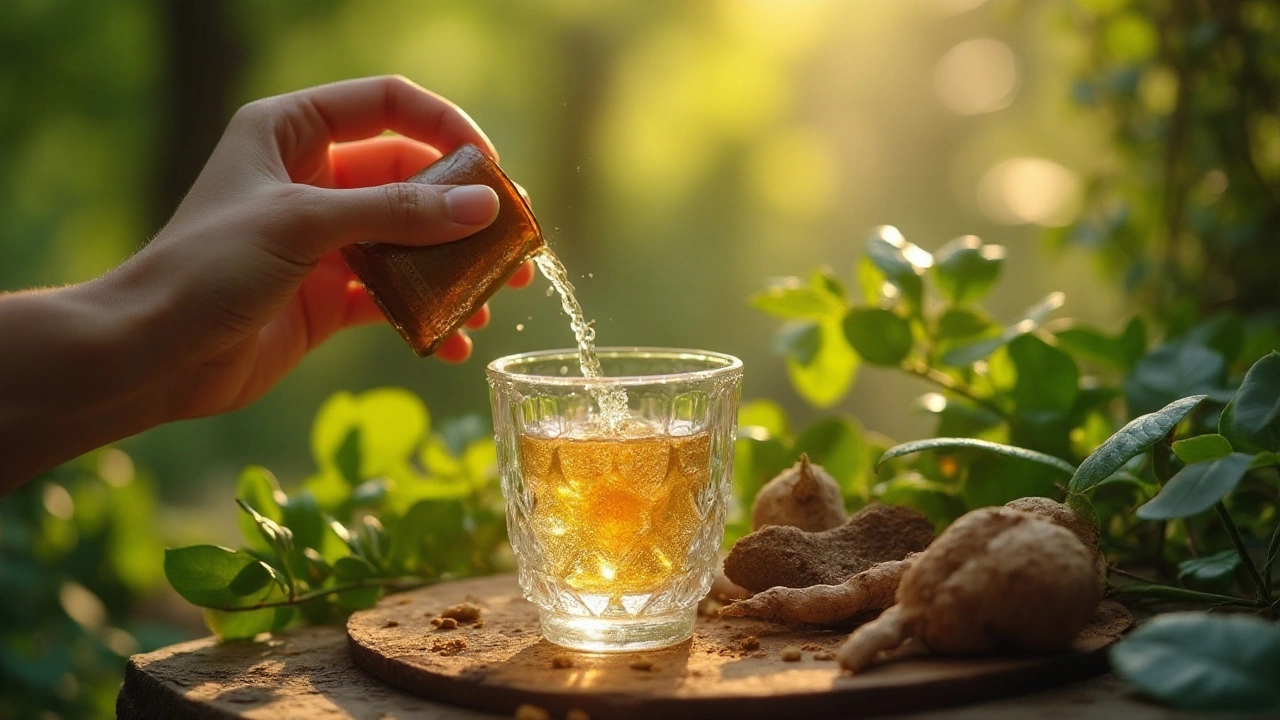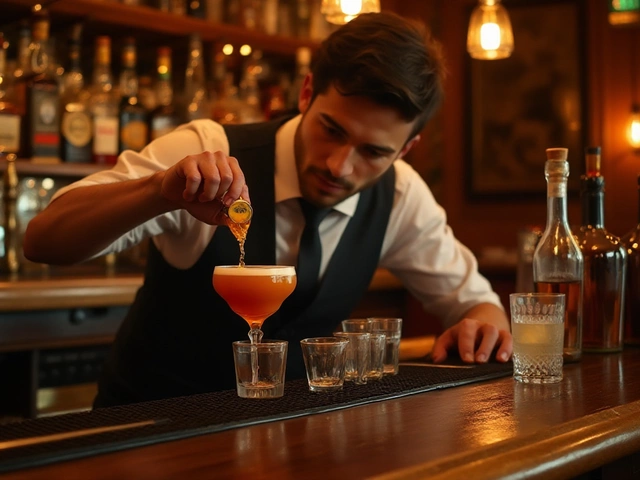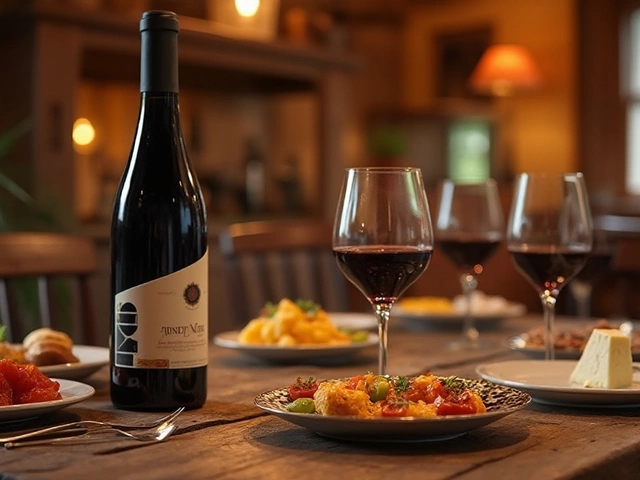In our world where choices are plentiful, the search for buzz-inducing drinks without alcohol is more compelling now than ever. For those seeking a little lift without the hangover, non-alcoholic beverages with a natural buzz are stepping into the spotlight.
From the South Pacific to your local café, options like kava and kombucha are making waves. Not just hippie hype, these drinks have roots in ancient traditions and modern wellness. So, what exactly makes them work, and why are they worth a try?
This article delves into the drinks that promise a natural buzz, touching upon the intriguing ingredients that could offer a lift in spirits and energy. Whether you're cutting out alcohol for lifestyle reasons or just curious about what's out there, here's a guide to non-alcoholic options that pack a punch.
- Understanding the Non-Alcoholic Buzz
- Kava: The Traditional Mood Booster
- Kombucha: Fermented Fizz with Benefits
- Adaptogens: Natural Stress Relievers
- Herbal Tonics: Ancient Elixirs Reimagined
- CBD-Infused Beverages: The Modern Relaxant
Understanding the Non-Alcoholic Buzz
When we think of getting a buzz, the mind often drifts toward alcoholic beverages, but non-alcoholic options are gaining traction and offering unique experiences. A non-alcoholic buzz emerges from natural ingredients, bringing with them a host of benefits that go beyond just a mild euphoria. While alcohol works primarily by depressing the nervous system, these non-alcoholic alternatives often stimulate it or modulate it through different pathways. This leads not just to a feeling of being uplifted but can also result in better focus, relaxation, or sometimes an altered state that many describe as euphoric.
The ingredients that bring about this state mostly have roots in traditional medicine and wellness practices. Kava, for instance, has been used for centuries in the South Pacific for its calming effects. Similarly, kombucha has a long history tied to Chinese culture as a tea of immortality, praised for its digestive benefits. These drinks work by leveraging compounds such as kavalactones in kava or probiotics in kombucha, interacting with our body's chemistry to produce their effects. The non-alcoholic drinks aren't just about avoiding the downsides of alcohol; they're about harnessing the natural potential of these ingredients.
According to Dr. Sarah Brewer, a well-respected nutritionist, "These alternative beverages can enhance one's mood without compromising health or safety, making them excellent choices for those seeking a new kind of comfort drink."
Many of these drinks are also crafted with the idea of holistic wellness in mind. For instance, adaptogen-infused beverages claim to help the body resist stressors of all kinds, whether physical, chemical, or biological. When you consume these drinks, they allow your body to better adapt to stress, all while leaving you with a slight buzz of alertness. Experts suggest that incorporating these drinks into your routine could easily align with a health-conscious lifestyle that emphasizes natural, sustainable living.
Moreover, there's an interesting intersection between these euphoric drinks and current trends, such as mindfulness and wellness culture. Whether consumed in social settings, or as a solo unwind routine, these drinks promote a sense of community and wellbeing. Additionally, as they are legal and typically safe from the restrictions that govern alcoholic beverages, they offer wider appeal and convenience. Let's explore how they can become a staple, not just in health shops, but across various drinking occasions where people still wish to engage without the adverse effects of alcohol.
For those who wish to experiment, it's worth starting with a single variety and gradually sampling different types. You can expect a range of effects based on the choice of drink and personal physiology. With a growing selection of options, everyone is bound to find something that suits their palate and desired effects. It's fascinating how diverse ingredients can yield a similar buzz while leaving the taste, aroma, and even the story behind each drink as a rich tapestry to delve into. A world of discovery awaits as one begins to appreciate the subtle yet profound buzz that non-alcoholic drinks can bring.
Kava: The Traditional Mood Booster
Kava, a non-alcoholic drink with deep roots in Pacific Island cultures, has been revered for its calming properties for centuries. It's derived from the roots of the Piper methysticum plant, which are traditionally ground down and mixed with water to create a soothing beverage. The tranquilizing effects of kava are attributed to kavalactones, the active compounds that interact with the brain's limbic system, the area responsible for emotions. For those interested in finding a buzz without alcohol, kava emerges as a significant player. People sipping kava often report feelings of relaxation, mild euphoria, and reduced anxiety. Notably, kava allows you to unwind without impairing cognitive abilities, making it a cherished evening ritual in many South Pacific cultures.
The process of preparing kava is steeped in tradition, a ceremony that respects its pacifying potential. While the traditional method involves manual labour, modern adaptations have seen kava bars flourishing, offering these non-alcoholic drinks in various forms, from teas to capsules. It’s fascinating how this ancient practice has woven its way into modern wellness trends worldwide. Scientifically, kava stands as a legitimate alternative to prescription drugs in treating anxiety disorders, backed by numerous studies. According to a study published in the Journal of Clinical Psychopharmacology, kava has been shown to improve symptoms of generalized anxiety, noted for its low side effect profile. A pleasant bonus is the muscle relaxation it provides, making it an ideal end-of-day respite, especially for those with physically demanding routines.
Consumption of kava is not without its critics and cautions, however. There are known risks, particularly with overconsumption, which can lead to hepatotoxicity. Thus, moderate use is often emphasized in both traditional practices and medical advisories. Many retailers who sell kava emphasize quality control, sourcing plants from trusted locations that respect traditional cultivation methods. Consumers today have accesses to myriad kava-based products, including instant mixes; these lessen the burden of preparation while preserving the potential benefits. Yet, nothing quite compares to the ritual of traditional kava preparation, where time taken to prepare is a significant part of the enjoyment. In Sydney, where the wellness scene is vibrant, kava has found a niche among those seeking a balance of relaxation and social evenings, minus the alcohol. As you sip, a 'Pacific zen' spreads gently through the body, marking kava as more than just a drink; it is a cultural experience worth savoring.
"Kava has exciting potential as a natural remedy, offering an effective alternative for managing stress and anxiety," says Dr. Jerome Sarris from the University of Queensland. His research underscores kava’s suitability as a safer option, compared to synthetic pharmaceuticals.
On the market today, kava-infused products roll out in creative formats, ranging from wellness powders to ready-to-drink kava in cans—testament to its growing popularity. Understanding the varying strengths and effects of different kava strains is crucial for beginners. Vanuatu, Hawaii, and Fiji are renowned for producing some of the most potent strains, and the choice often depends on personal preference regarding taste and strength. Importantly, seekers should approach kava with an understanding of their own body’s reaction to its effects. Living in the age of information gives us ample resources to research thoroughly before diving into this calming world. Whether you’re eager to try it for its buzz, or intrigued by its ability to foster community and ceremony, kava stands out as a remarkable non-alcoholic contender offering a holistic approach to well-being.

Kombucha: Fermented Fizz with Benefits
Kombucha, often recognized by its fizzy nature, has captured the curiosity of many drink enthusiasts looking for non-alcoholic drinks with a natural buzz. Essentially, it's a fermented tea that dates back over two thousand years, originating from the Northeast China region. This ancient elixir has gained popularity in recent years for its unique taste and potential health benefits, making it an appealing choice for those seeking something other than the typical sugary soft drinks or alcoholic beverages. The magic behind kombucha lies in its fermentation process. It's created by fermenting sweetened tea with a symbiotic culture of bacteria and yeast, known as SCOBY. During this fermentation, the sugars in the tea are converted into alcohol and then further into organic acids. While the alcohol content in commercially available kombucha is usually quite low, it is this very process that often results in that slight 'buzz' that enthusiasts talk about. Not only does it provide a unique taste, but some believe the fizzy nature along with its probiotic content also contributes to its 'feel-good' effects.
Beyond the buzz, kombucha offers a range of benefits that make it more than just a trendy choice. It’s packed with probiotics, the friendly bacteria that are believed to improve gut health and aid digestion. A well-balanced microbiome, supported by probiotics, has been linked to improved mood, energy levels, and even immunity. For those looking for a natural energy lift, some research suggests that the combination of caffeine from the tea, the vitamins produced during fermentation, and the carbonation can combine to offer a gentle, sustained boost akin to an energy drink but without the sugar crash. Kombucha contains B vitamins, which are known to enhance energy levels, and it's been noted to provide an antioxidants boost, fighting off free radicals that can damage cells.
The drink comes in a myriad of flavors, thanks to the variety of teas and additional ingredients like fruits, herbs, and spices used in its making. This wide range of flavors allows everyone from kombucha novices to enthusiasts to find a variation that suits their palate. Whether you're sipping on ginger-lemon kombucha for an invigorating morning start or reaching for a calming lavender brew in the evening, the possibilities are endless. It’s also worth exploring local or artisanal breweries, as they often offer some of the most inventive and flavorful concoctions. It's no wonder kombucha is becoming a go-to choice in the realm of non-alcoholic options.
However, kombucha isn't without its caveats. People with certain health conditions or pregnant and breastfeeding women should consume it in moderation or consult with a healthcare provider due to its fermentation process and trace alcohol content. Additionally, homemade versions, which are popular for those who love brewing their own drinks, need careful attention to hygiene and brewing times to prevent contaminations. Kombucha may not be for everyone, especially if you're sensitive to caffeine, but it continues to charm those seeking a drink that's more than the sum of its parts.
Intriguingly, studies have highlighted kombucha's potential effects on health other than gut wellness. Research published in the Journal of Medicinal Food suggested that kombucha could help in reducing liver toxicity, and others have pointed out its potential in balancing cholesterol and blood sugar levels, though more research is needed to verify these findings. It's an exciting area of study as more scientists delve into understanding how this fermented drink might contribute to well-being beyond what has already been established. Whether you're drawn in by its reputed health perks or the enticing flavors, kombucha stands as a fascinating crossover between a healthy drink and a refreshing buzz.
"Kombucha is truly a magical tonic; its growing acceptance worldwide seems to be the gateway for broader acceptance for other fermented foods," says Dr. Gabe M. Garnett, a renowned nutritionist and fermented foods researcher. This embrace of fermented beverages like kombucha demonstrates a significant shift in consumer demands towards choices that strike a balance between enjoyment and health benefits. So, the next time you find yourself pondering what non-alcoholic drinks offer a bit of a lift, kombucha stands ready with its bubbly personality and a legacy that speaks to its curious yet compelling nature.
Adaptogens: Natural Stress Relievers
Living in a fast-paced world means that stress has become something of a constant companion, often unwelcome and unmanageable. Enter adaptogens, a class of herbs and mushrooms known for their ability to help us adapt to stress and maintain balance. These remarkable plants and fungi have been used for centuries in traditional medicine systems like Ayurveda and Traditional Chinese Medicine. Modern science is beginning to catch up, with studies supporting their efficacy in helping the body resist the negative impacts of stress. The charm of adaptogens lies in their ability to work with the body's endocrine system, which regulates hormones. This can support metabolism, fatigue resistance, and an enhanced sense of wellbeing. So, what is it about these herbs that make them effective, and how can you incorporate them into your daily life with non-alcoholic drinks?
Popular Adaptogenic Herbs
If you're venturing into the world of adaptogens, a few key players often steal the spotlight. Ashwagandha, for instance, is celebrated for its calming properties. It's said to help manage stress and promote relaxation by lowering cortisol levels and supporting overall nervous system health. Then there’s Rhodiola Rosea, known as an energy booster. It helps increase your stamina and energy by enhancing your body's resilience to physical and emotional stress. Meanwhile, holy basil, often revered as an ‘elixir of life,’ is great for maintaining homeostasis in the body, helping your system rebalance itself naturally. These herbs are potent on their own, but many non-alcoholic beverages blend them creatively with other ingredients to enhance both flavor and benefits.
According to Dr. Brenda Powell from The Cleveland Clinic, "Adaptogens help your body handle stress. They’re meant to bring us back to the middle."
Consuming Adaptogens in Beverages
Many wellness-driven companies are crafting beverages that highlight adaptogens, allowing you to incorporate them into your life with ease and even pleasure. Adaptogenic teas have become quite popular, featuring blends that might include ashwagandha or tulsi. Elixirs and tonics make use of powdered forms of these herbs to blend easily, providing a convenient way to enjoy their benefits. Think of morning brews or afternoon delights, where substituting your usual pick-me-up with an adaptogenic drink can not only enhance your focus but also smooth out the harsh edges of stress. Making this adjustment may take a bit of time, but the long-term benefits can be well worth any initial resistance to change.
For those who are data-driven, consider a small yet growing body of research that suggests incorporating adaptogens into your routine may increase your ability to maintain focus and a sense of calm under pressure. Although we need more large-scale studies, many people find these natural solutions help them feel more balanced in their day-to-day lives, dispelling the myth that only pharmaceuticals can combat stress. Next time you're looking for a buzz that doesn't involve alcohol, consider the balancing effects of adaptogens, which can be a gentle yet powerful ally in helping you cope with life's challenges.

Herbal Tonics: Ancient Elixirs Reimagined
The magic of herbal tonics has long captivated our imaginations, tapping into the roots of ancient wisdom and traditional medicine. Historically, these tonics were considered elixirs of life, designed to balance and restore harmony within the body. In today’s bustling world, they have been transformed into a modern-day metaphor for vitality and wellness, each sip offering an invigorating blend of taste and function. The beauty of these non-alcoholic drinks lies in their versatility; they can be enjoyed hot or cold, mixed with various flavors, or sipped purely for their rejuvenating essence. The fascination with these drinks has only grown in recent years as people seek more wholesome lifestyles, and the market reflects this with a plethora of options. Whether it's the aromatic allure of chamomile-laced concoctions or the invigorating power of ginger-infused blends, herbal tonics cater to a wide range of palates and preferences.
One shining example is the beloved beet kvass, known not just for its rich, earthy flavor, but also for its probiotic qualities that aid in digestion. Often utilized beyond its taste, this tonic is praised for promoting gut health—an integral part of overall well-being. Similarly, journey to South Asia and you'll find turmeric golden milk, renowned for its anti-inflammatory properties, bringing a hint of ritual magic to the everyday cup with its bold, golden hue. Such traditional drinks not only bridge cultural gaps but also highlight how regional wisdom adapts across different culinary landscapes. As modern consumers continue to prioritize health, the benefits of herbal tonics come into sharper focus. These drinks often harness the power of adaptogenic plants, like ashwagandha, which helps reduce stress and anxiety, contributing to an uplifted mood and buzz.
Some brands now add another layer of allure by incorporating adaptogens into their herbal blends, aiming to give drinkers an enhanced sense of energy stability and mental fortitude. This trend often reflects an increased desire to connect with nature in a profound manner—aligning body, mind, and spirit through thoughtfully-curated ingredients. Subtle notes of rose or lavender could create a feeling of serene euphoria, while the sharpness of rosemary may invigorate the senses, all without resorting to artificial additives or caffeine.
“The resurgence in herbal tonics can be attributed to a collective desire to return to nature,” says registered herbalist David Winston, emphasizing the growing trend towards organic and plant-based options.For those eager to explore, making herbal tonics at home can be both a creative outlet and a delightful journey into self-discovery. To get started, one might consider blending simple herbs like peppermint or lemon verbena, steeping them to bring about refreshing, minty flavors or uplifting citrus notes, respectively. As herblore continues to weave its tale through our contemporary narratives, variations in herbal tonics offer personalized paths to wellness. Truly, these age-old potions have reinvented themselves, inviting each one of us to taste the past while savoring the present.
CBD-Infused Beverages: The Modern Relaxant
The buzz around CBD-infused beverages is more than just a passing trend. These drinks, which include sparkling waters, teas, and sodas, are crafted to deliver a sense of relaxation and calm, without any psychoactive effects. Unlike other ingredients found in non-alcoholic drinks, CBD, or cannabidiol, is derived from the hemp plant and is known for its therapeutic potential. As interest in this ingredient grows, so does the variety of available products, offering consumers plenty of choices to test and enjoy.
The surge in demand for CBD-infused drinks can be attributed to the compound’s reputed benefits for anxiety reduction and stress management. Many users have reported a subtle yet noticeable lift in mood and overall well-being after consuming CBD beverages. It's not uncommon to find anecdotes describing how these drinks help take the edge off the daily grind. A growing body of research supports these claims, underscoring CBD's role in influencing serotonin levels in the brain, which can play a part in mood regulation.
In fact, a recent survey conducted by the Brightfield Group highlighted that about 40% of CBD consumers are interested in trying beverage formats, largely due to their ease of use and consistency. The market's response has been significant, with an array of options now lining grocery store shelves and online marketplaces. These products can range from calming hemp teas to CBD-infused coffees designed to kickstart your day with calm clarity.
"CBD may have a calming effect on the central nervous system, according to a study published in the Journal of Clinical Psychopharmacology," notes Dr. Mary Clifton, an internal medicine doctor specializing in cannabinoids. "This makes CBD-infused beverages an appealing choice for those seeking a natural path to peace."
It's essential for consumers to understand dosing when venturing into the realm of CBD beverages. Each drink varies in its concentration of CBD, typically ranging from 5mg to 25mg per serving. Beginners are often encouraged to start with a smaller dose to determine personal tolerance and response. As with any supplement, it's wise to consult with a healthcare professional, especially for individuals with specific health conditions or those taking medications.
Despite the potential benefits, regulatory complexities around CBD-infused drinks remain, particularly in places with stricter guidelines. However, as legislative landscapes shift and consumer interest persists, these obstacles are expected to decrease. The ongoing conversation about the legal status of CBD continues to play a pivotal role in the evolution and expansion of the beverage market.
The allure of CBD-infused beverages lies not only in their potential calming effects but also in their promise as versatile and innovative drink options. They represent a merging of wellness trends with the ever-creative beverage industry, presenting drinks that feel contemporary yet deeply rooted in the quest for relaxation. Whether sipped at the end of a hectic day or shared with friends during a casual meet-up, these drinks are more than their ingredients—they're an invitation to pause and unwind.


